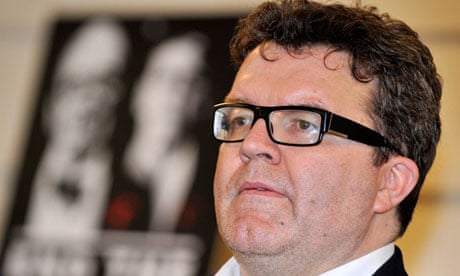Tom Watson, Labour's general election co-ordinator, has resigned from the shadow cabinet saying he wants to reunify the party after the splits caused by his role in the controversial selection procedures in the Falkirk constituency involving his union Unite.
Watson revealed on his blog that he offered to resign on Tuesday, but his offer had been rejected by Ed Miliband.
The decision follows difficult meetings in the Labour leader's office over the past 48 hours, with different members of the shadow cabinet giving conflicting advice on how to handle the growing crisis caused by Falkirk.
It stems from the selection race to replace the MP Eric Joyce who resigned from the party after admitting assault in a Commons bar brawl. It is alleged the Unite union tried to "stitch up" the selection process by cramming the constituency with new members.
In his letter, Watson also disclosed that he wanted the party to publish the report into what happened at the Falkirk selection, something the party has so far refused to do and has only been seen by a few people in the highest echelons of the party. It is alleged that the report shows wrongdoing on both sides of a bitter selection battle, not just by members of Unite.
In a letter to Miliband, Watson referred to his initial offer to resign and said: "I've thought about it and still feel it is better for you and the future unity of the party that I go now. There are some who have not forgiven me for resigning in 2006. I fully accept the consequences of that decision and genuinely hope my departure allows the party to move on."
The reference to 2006 in the letter is to his role in bringing down the leadership of Tony Blair in order to install Gordon Brown.
He continued: "Yet it's not the unattributed shadow cabinet briefings around the mess in Falkirk that has convinced me that the arrangement has run its course (though they don't help). I believe that the report should be published – in full – and the whole truth told as soon as possible so that the record can be made clear. I've still not seen the report but believe there are an awful lot of spurious suppositions being written."
He said he wished to use the backbenches to pursue a range of issues, including the surveillance state, the aftermath of the phone-hacking scandal and grass roots responses to austerity.
"Having resigned a couple of times before, I know how puckish lobby hacks might choose to misconstrue the departure," he wrote. "So to make it harder for them let me say this: I'm proud of your Buddha-like qualities of patience, deep thought, compassion and resolve. I remain your loyal servant. I'll always be on hand to help you if you need me. I just don't think you need me in the shadow cabinet any more. After nearly thirty years of this, I feel like I've seen the merry-go-round turn too many times. Whereas the shadow cabinet's for people who still want to get dizzy.
"You have it in you to be an outstanding Labour prime minister. The road ahead is always rocky, but I will be with you all of the way, cheering you on from the backbenches. You're my friend and leader, and I'm going to do all I can to make sure you win in 2015."
He ended the letter on a lighter note. "John Humphrys the BBC Radio Today presenter asked me why you were not at Glastonbury this weekend. I said Labour leaders can't be seen standing in muddy fields listening to bands. And then I thought how terribly sad that this is true. So: be that great Labour leader that you can be, but try to have a real life too. And if you want to see an awesome band, I recommend Drenge."
The resignation is unlikely to bring an end to media interest in the story, and there will now be pressure on Miliband to explain whether he is going to publish the report into Falkirk. A broader problem will be sorting out the factionalism that seems to be more rife in the party than is possibly realised.
Watson pointedly insisted he had done nothing wrong, and put the emphasis on not wishing to go through the gruelling mill of frontbench politics. But his critics will say he has used his power to build an organisation that rewards his friends. His many defenders will argue that all political factions work to win selection for their political allies.







Comments (…)
Sign in or create your Guardian account to join the discussion